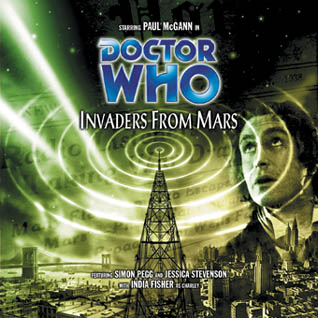
|
The Lederblakker |
Reviews

|
The Lederblakker |
Conquerors of Space! by Stephen Maslin 9/5/16
It's not that it hadn't been done before but the 'Aliens-Are-Just-Like-Us-Really' meme in Mark Gatiss' 2002 audio treat Invaders From Mars is just such a great example. Fair enough, the Lederblakker hatchlings could give the Drashigs a run for their money in an Ear-Piercing Shriek Competition, but the adults are a very different kettle of fish: it is not their altered voices or what they are supposed to look like makes them so effective but that they have enough human failings to make them instantly knowable. They are (and this is a very hard job to pull off) both ridiculous and highly dangerous. One might have said the same about Adolf Hitler: idiotic pageantry, a laughable moustache and gas chambers. Or think of hippos: really funny things, with their preposterous way of trotting along and those wiggly ears that brush away flies. Funny, that is, until one decides to attack you.
Key to this is the way that Invaders From Mars plays opposing elements off against each other. For example, when Charley first encounters the adult Lederblakker, she is genuinely terrified, even though their beating wings sound like an umbrella and their dialogue concerns how odd humans look ("without much hair"), full of quality bickering of which Robert Holmes himself would have been proud.
Though the story dates from a couple of years before the announcement that Doctor Who was returning to our screens, Mark Gatiss was by that time already a television stalwart and could have been seen as slumming it by devoting his efforts to writing fan-centric audio. Invaders From Mars (and Phantasmagoria, Republica and Island of Lost Souls before it) seems to have been done purely for the love of it, and the Lederblakker are the kind of alien you might expect from an industry professional stretching their legs: a tad self-mocking, though none the worse for that. It is tempting to look down on aliens that are played for laughs, but problems only arise when aliens are only played for laughs. For all their daftness, the Lederblakker still have the potential for causing a great deal of harm, something of which Gatiss' script never loses sight.
Are, however, the Lederblakker the real villains in Invaders From Mars? At times they seem almost like innocents compared to the human villains on offer: Cosmo Devine easily outdoes them in sheer 'orribleness, and the only thing that stops the assorted mafiosi on hand from being just as much a threat is their own brutish incompetence. More than once, we are reminded of the human capacity for "unpleasantness" by its clearly outstripping that of the aliens.
It's a shame that we shall not be encountering such an entertaining species as the Lederblakker again, but perhaps that's just as well: Big Finish's track record with aliens returning for a second bite of the cherry has not always been stellar. The Grel, for example, so perfectly realized in Oh No It Isn't!, were simply dreadful when they returned re-voiced in The Grel Escape. See also Nimrod, Nobody No One, the Viyrans, the inhabitants of the planet Vilag (though the latter were never any good in the first place)...
AFTERTHOUGHT
In much the same way that Nev Fountain's work for the BBC has never quite matched the quality of his work for Big Finish, Mark Gatiss' televisual Who villains did not at first come up to the standard set by such as the Lederblakker or by Nicholas Valentine in Phantasmagoria a year earlier. His early New Series villains (the Gelth, the Wire) were precisely what the Lederblakker were not: rather ordinary, science-fictional staples. It was only when he played to his own strengths - quirkiness (Night Terrors), retro (Cold War) and camp (The Crimson Horror) - that Gatiss restored some measure of authority. He also remains the best Doctor we never had (The Web of Caves) and his take on the Master in Big Finish's 2003 audio Sympathy for the Devil is simply irresistible.